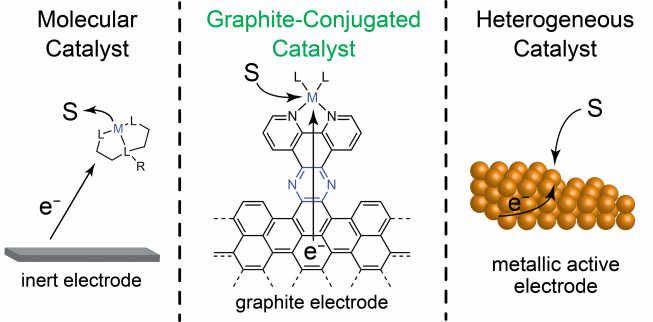Abstract:
The efficient interconversion of electrical and chemical energy requires catalysts capable of accelerating complex multi-electron reactions at electrified interfaces. These reactions can be carried out at the metallic surface sites of heterogeneous electrocatalysts or via redox mediation at molecular electrocatalysts. Molecular catalysts yield readily to synthetic alteration of their redox properties and secondary coordination sphere, permitting systematic tuning of their activity and selectivity. Similar control is difficult to achieve with heterogeneous electrocatalysts because they typically exhibit a distribution of active site geometries and local electronic structures, which are recalcitrant to molecular-level synthetic modification. However, metallic heterogeneous electrocatalysts benefit from a continuum of electronic states which distribute the redox burden of a multi-electron transformation, enabling more efficient catalysis. We have developed a simple synthetic strategy for conjugating well-defined molecular catalyst active sites with the extended states of graphitic solids. Electrochemical and spectroscopic data indicate that these graphite-conjugated catalysts do not behave like their molecular analogues, but rather as metallic active sites with molecular definition, providing a unique bridge between the traditionally disparate fields of molecular and heterogeneous electrocatalysis.

Bio:
Yogesh (Yogi) Surendranath is the Paul M. Cook Career Development Associate Professor of Chemistry at the Massachusetts Institute of Technology. He holds dual bachelor's degrees in chemistry and physics from the University of Virginia and a PhD in inorganic chemistry from MIT, obtained under the direction of Professor Daniel Nocera. As part of his graduate work, he investigated the mechanism oxygen evolution catalysis by oxidic cobalt-based materials. After receiving his PhD, Professor Surendranath undertook postdoctoral studies as a Miller Research Fellow at UC Berkeley, under the direction of Professor Paul Alivisatos. In the summer of 2013, he assumed his current position at MIT. His research group aims to store renewable electricity in energy-dense chemical bonds by controlling interfacial reactivity at the molecular level. Professor Surendranath has authored over 50 publications and is the recipient of numerous awards including an NSF CAREER award, a DOE Young Investigator Award, an Air Force Young Investigator Award, a Toyota Young Investigator Award from The Electrochemical Society, an Alfred P. Sloan Foundation Fellowship, and the Cottrell Scholar Award.

